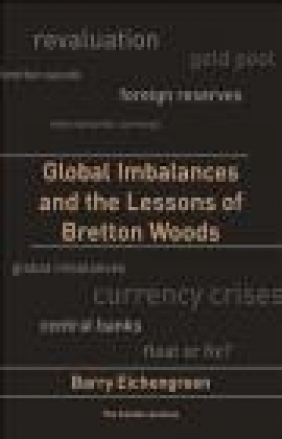Global Imbalances and the Lessons of Bretton Woods
Barry J. Eichengreen, B Eichengreen
Global Imbalances and the Lessons of Bretton Woods
Barry J. Eichengreen, B Eichengreen
- Producent: MIT Press Massachusets Institute of Tech nology
- Rok produkcji: 2006
- ISBN: 9780262050845
- Ilość stron: 208
- Oprawa: Twarda
Niedostępna
Opis: Global Imbalances and the Lessons of Bretton Woods - Barry J. Eichengreen, B Eichengreen
In Global Imbalances and the Lessons of Bretton Woods, Barry Eichengreen takes issue with the argument that today's international financial system is largely analogous to the Bretton Woods System of the period 1958 to 1973. Then, as now, it has been argued, the United States ran balance of payment deficits, provided international reserves to other countries, and acted as export market of last resort for the rest of the world. Then, as now, the story continues, other countries were reluctant to revalue their currencies for fear of seeing their export-led growth slow and suffering capital losses on their foreign reserves. Eichengreen argues in response that the power of historical analogy lies not just in finding parallels but in highlighting differences, and he finds important differences in the structure of the world economy today. Such differences, he concludes, mean that the current constellation of exchange rates and payments imbalances is unlikely to last as long as the original Bretton Woods System.Two of the most salient differences are the twin deficits and low savings rate of the United States, which do not augur well for the sustainability of the country's international position. Such differences, he concludes, mean that the current constellation of exchange rates and payments imbalances is unlikely to last as long as the original Bretton Woods System.After identifying these differences, Eichengreen looks in detail at the Gold Pool, the mechanism through which European central banks sought to support the dollar in the 1960s. He shows that the Pool was fragile and short lived, which does not bode well for collective efforts on the part of Asian central banks to restrain reserve diversification and support the dollar today. He studies Japan's exit from its dollar peg in 1971, drawing lessons for China's transition to greater exchange rate flexibility. And he considers the history of reserve currency competition, asking if it has lessons for whether the dollar is destined to lose its standing as preeminent international currency to the euro or even the Chinese renminbi. "Eichengreen's book should be the starting point for the debate about what will happen after the inevitable end of an unsustainable system. With this and his many other books, Eichengreen has established himself as one of the most important voices in that debate." Rawi Abdelal Business History Review
Szczegóły: Global Imbalances and the Lessons of Bretton Woods - Barry J. Eichengreen, B Eichengreen
Tytuł: Global Imbalances and the Lessons of Bretton Woods
Autor: Barry J. Eichengreen, B Eichengreen
Producent: MIT Press Massachusets Institute of Tech nology
ISBN: 9780262050845
Rok produkcji: 2006
Ilość stron: 208
Oprawa: Twarda
Waga: 0.34 kg































